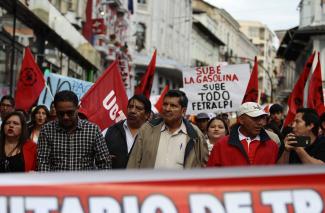Ecuador
Anger about shift to the right

Shortly after taking office, Moreno claimed that Correa had left him a legacy of corruption, mismanagement and debt. Conservative opposition parties and the private media willingly endorsed this message. The state media were brought into line too, and the court of auditors became an instrument of political persecution.
From mid-2014, Ecuador was hurt by low oil prices and the strong US dollar, which serves as its legal tender. The government’s credibility was dented by corruption scandals, which involved the state-owned oil company Petroecuador and the Brazilian construction giant Odebrecht for example.
When Moreno became president, however, the recession was over. Instead of incrementally correcting Correa’s reforms, which would have been necessary, he began to dismantle them. In February 2018, he held a referendum on seven different issues, with some questions on the ballot being misleading. The referendum did not get the Constitutional Court’s required approval. Nonetheless, right-wing parties and business leaders supported Moreno, and so did trade unions and social movements. Correa led the “no” campaign, which won 37 % of the votes. His campaign struggled with serious obstacles and only got very little media coverage.
Among other things, the referendum dismissed the Council for Civic Participation and Social Control (CPCCS). Moreno secured a monopoly on proposing members of a transitional council, and the parliament merely approved them. The Transitional Council (CPCCS-T) was given powers far beyond those foreseen by the constitution. Under the leadership of Julio César Trujillo, it has since dismissed officials from the judiciary and state agencies with powers of oversight, appointing interim successors and grabbing further powers. Even judges of the Constitutional Court were ousted. Their positions are still vacant since the selection process for new judges has not yet been concluded. Overall, the lack of judicial independence has led to the instalment of a system for prosecuting political opponents.
The political instrumentalisation of the judiciary started with the trial of Vice President Jorge Glas. He was sentenced to six years in prison without conclusive evidence, mainly on the basis of an Odebrecht manager’s testimony. The court used an outdated penal code to pass a harsher sentence and to depose the vice president. Reacting to his arbitrary transfer from Quito to the prison in Latacunga, Glas went on hunger strike for weeks.
Former officials of the Correa administration are increasingly being hounded politically and persecuted legally. Correa is facing a wide variety of charges himself and has fled to Belgium. Interpol recently refused to issue an international arrest warrant against him.
Since the referendum in early 2018, Moreno’s rates of approval have been dropping. The people's confidence in state institutions has collapsed. A new low was reached when Vice President Maria Alejandra Vicuña resigned on corruption charges in December. The new vice president is Otto Sonnenholzner, a largely unknown entrepreneur who received the support of Moreno supporters and right wing parties in the legislative.
Moreno was elected as a candidate of the left, but is implementing a neoliberal economic agenda with important concessions to rent-seeking sectors. The shift to the right is illustrated by:
- the appointment of Richard Martínez, previously the president of the employers’ association, as minister for economics and finance,
- tax cuts and a tax amnesty for the economic elite and
- the neglect of spending on and investing in social protection.
The president is less and less able to blame Correa for all the problems. Dissatisfaction in the country is growing, and civil society is increasingly backing away from the government. Decline has returned to Ecuador after 10 years of relative political stability and successes in reducing poverty and inequality.
Timm Benjamin Schützhofer is a political scientist and holds a Master’s degree in global political economy. As part of his doctoral studies at the University of Kassel, he examines the fiscal policy challenges of resource-dependent states using Ecuador as an example.
timm.schuetzhofer@gmx.de







